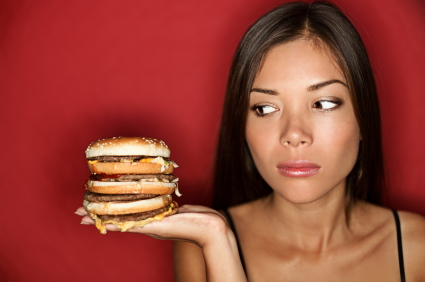
Here’s the conversation we all have at some point.
“I really should have that grilled tuna and green salad tonight for dinner…and just plain water…it will taste good and keep me on track with my weight loss…”
“But, I’m really stressed out…work is crazy right now, I have like zero time to myself…some cheese enchiladas and chips and chili con queso and a couple of beers is what I need…”
“But, I’ll save some money if I just eat in tonight…”
“It’s been such a long week…I’m gonna’ stop at that Mexican place…”
If you had this conversation with yourself once in a while, you probably wouldn’t change your diet plans as often as you change your socks. But, it’s not just once in a while. This kind of duality happens very frequently in people who live in this hectic, stressful, I-never-have-enough-time world.
We’re over committed with continuous partial attention to almost everything.
The Root of the Problem
Energy. Bottom line, you don’t have enough. And I don’t mean physical energy like the kind you need to, say, play a game of basketball.
To make changes in your life, like what you eat, and transform the new behavior into a long standing habit, you have to spend mental and emotional energy.
But most of us do not consciously manage our energy.
In their book, The Power of Full Engagement, Jim Loehr and Tony Schwartz explain that we all have the same amount of time in a day and that by managing your energy, you better manage your performance. Loerh and Schwartz identify four areas that we need to manage – physical, mental, emotional, and spiritual. And, that over or under using one or more of those sources leads to lower performance.
So, back to the self-talk and pit stop at the Mexican restaurant.
The harried, over-connected world that we all now live in – Facebook, Twitter, cell phone, iPad, laptop, jobs, kids, a mortgage, eat this, don’t eat that, exercise more, and on and on, leaves you in a depleted mental and emotional state.
Your life is an energy vampire.
The result is that you simply no longer have the capacity to make choices that are in your best long term interest.
So you opt for the cheese enchiladas, chili con queso, and beer.
The Proof
You might be wondering if I just made this up. I know right about now I would be asking, “How the heck do you know that?”
Thanks to psychological science, there’s some support for the idea of a mental / emotional “energy bank”.
Shiv and Fedorikhin, in a study on temptation and decision making, found that when the “thinking” region of your brain, the area responsible for choosing enchiladas over a green salad, is too busy, you cave to the temptation.(1)
The authors gathered a group of people and explained that they were testing how well people could remember information with a change in environment.
They would be given a number to remember and would then be asked to repeat the number to an examiner in another room.
Simple enough.
Some people were give a simple number, like 46, while others were given a more complex number such as 4027523.
Along the way to the second room, another examiner was placed at a table with fresh fruit and chocolate cake.
The examiner then explained to each participant that they could choose one of the snacks and that she would give them a ticket to claim their snack after completing the task, in the next room, of remembering the number.
Who chose the cake? The people who had to remember “46” or the people who had to remember “4027523”?
The participants who were saddled with the larger number chose the cake far more often than those people who had only two digits to recall.
When your brain is strained, you cave to your desires.
What to Do
The first step you’ve already done: becoming aware of the issue.
Now that you know your ability to resist the enchiladas is in part related to your mental and emotional energy reserve, you can start examining things in your life that act as “energy leaks”.
Here are a few suggestions to get started:
- Sleep. I know it sounds simple enough but without adequate sleep, you start off the day in a deficit. You know you’re not getting enough sleep if, for example, you find yourself nodding off in an afternoon meeting.
- Increase the White Space. This means adding some time to your day or week where you have nothing on your calendar but, well, white space. I know some of you are probably writhing in your chair right now about doing nothing but that’s the point. If doing nothing makes you antsy, then you need to do more of it.
- Unplug. The world will still be here without Twitter, Facebook, Google+, Pinterest, etc. It’s okay. Give yourself some time away from all the noise so you can actually hear yourself think.
- Plan the Cave. You’ll be less likely to give in to your temptations frequently if you plan an indulgence occasionally. So, if you want to spurge on something, choose the day, what it will be, and when it will end. The planning removes some of the emotional overdrive.
Last thing. Go easy on yourself. Change is not always an easy thing so make your changes small enough to match the energy you actually have at your disposal. As you work to plug the “energy leaks”, you can take on more change.
What are your “energy leaks’? How do you deal with them?
(1) Shiv, B Fedorikhin, A. Heart and Mind in Conflict: The Interplay of Affect and Cognition in Consumer Decision Making.Journal of Consumer Research, Inc. ● Vol. 26 ● December 1999

